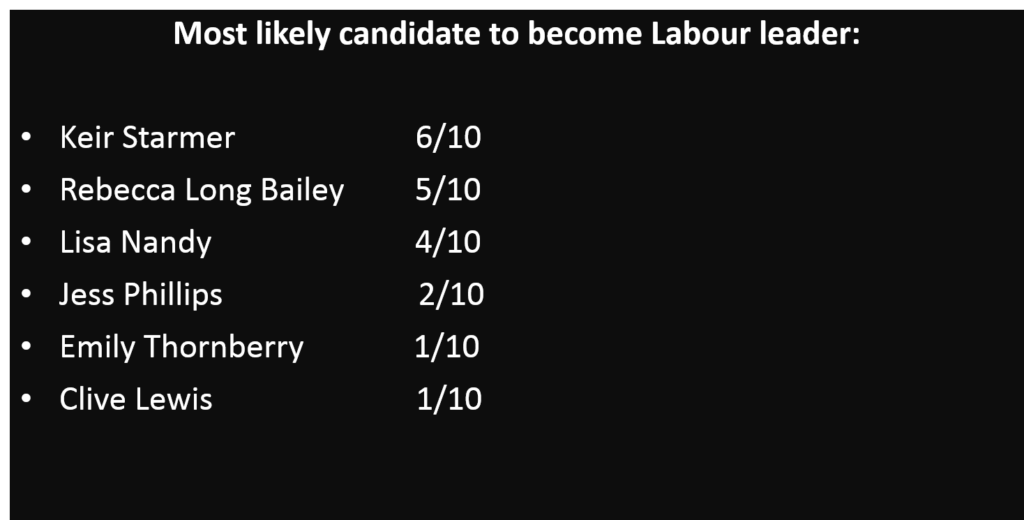Image: Keir Starmer QC. Picture credits: Chatham House | Attribution 2.0 Generic (CC BY 2.0)
The Labour party leadership starting gun was fired before election night was even over. At his own count in Islington, the Leader of the Opposition, Jeremy Corbyn, announced that he would not lead his party into another election.
Jeremy Corbyn announced in the following days that the election would begin on 7th January and it was later announced that the contest would conclude on 4th April. It appeared that for several years Jeremy Corbyn was grooming Laura Pidcock to replace him at the top of the party, however, her defeat on 12th December made the succession far less clear.
The early favourite amongst the Corbyn wing of the party has been Rebecca Long Bailey. On the far left of the party, Long Bailey is the closest to Corbyn’s economic programme, making her the clear favourite amongst the momentum wing that carried Corbyn to victory in two leadership contests.
This would make it likely that she could claim victory for Corbynomics once again, however, the early indications are that after a second general election defeat in three years, there is a willingness in the party to throw Corbyn’s politics by the wayside, opening a path for a more moderate Labour party once again.
Early polling shows that Kier Starmer, current shadow Brexit secretary and former head of crown prosecutions, has a significant lead over Long Bailey; 61-39 in head to head polling, with Kier Starmer also showing a significant lead over Long Bailey in a poll of all leading contenders.
Although Mr Starmer is a self-described socialist, he is considered to the right of the party, a more moderate candidate who can pull the party back to a more electable compromising position, uniting the party behind a set of values that the general electorate can also get behind.
This is perhaps true, and he is certainly the most likely candidate to win at this stage. However, with three months of the contest still to go, there is plenty of opportunity for movement. With two thirds of the country not knowing who any of the candidates are – according to Deltapoll – there is significant opportunity for one of the lesser known candidates to come from behind.

The most likely to jump up through this void is Jess Phillips. The Birmingham Yardley MP is seen as a less polished and more formidable figure, the kind that will face Boris Johnson head on – providing the prime minister with a test at the dispatch box and a formidable opponent at a general election.
She is currently the third placed candidate within Labour polling, a strong position to be in heading into a contest, however, it is likely that she is near her ceiling already within the party. Deeply disliked by many younger voters – perceived as a transphobic for previous comments and for being seen as a shoot from the hip candidate, unsuited for leadership.
She is evidently a highly capable candidate and would likely be Johnson’s most formidable opponent, but it is unlikely that she could claim the leadership at a ballot.
Lisa Nandy is perhaps the most unfamiliar name in the race. The Wigan MP is an unknown quantity, with a clear focus on local communities in ‘towns like Wigan’. She likely lacks the name recognition to succeed in the leadership contest, but she is evidently a hugely talented candidate, with the moderate ideas that could likely unite the differing factions within the party.
With such a long contest, any big mistakes from major candidates could see Nandy take their support and rise quickly through the polls. Rarely do leadership contests see the front runner prevail and with her roots in the north and clear economic ideas to reinvigorate the party and local communities – without the Corbynomics baggage – she is the dark horse in this race.
Emily Thornberry has been in the spotlight for several years, being one of the key figures within the party under Corbyn’s leadership. This likely plays against her, not seen as a frontrunner amongst the Corbyn wing (firmly stuck behind Long Bailer) she is also not seen as the moderate voice to win back the red wall that collapsed in 2019.
One of the major reasons cited for Labour’s defeat in these traditional heartlands is the Labour’s second referendum Brexit position that saw Boris Johnson favoured, despite being traditionally unfavoured in such regions. Emily Thornberry is often seen as being at the heart of this, unpopular in the north for several media comments over Brexit. Although certainly not disqualifying, it is likely that the party will see her as unable to win back such heartlands, from her north London constituency, making a leadership challenge unlikely to succeed.
The final candidate is Clive Lewis, who suffers from the fatal problem of not being a figurehead of anything within the party. The Norfolk MP is not Lisa Nandy, appealing to local northern communities; not Keir Starmer, bringing the party towards a moderate centre; nor Rebecca Long Bailey, providing continuity for the momentum wing of the party.
Clive Lewis is another capable candidate, but his lack of a base in any part of the party means that nobody is likely to coalesce around him. Towards the Corbyn wing of the party, but not quite far enough for momentum support, without any serious gaffs for other contenders he is unlikely to get far.
Currently it is Keir Starmer’s to lose. He is relatively popular amongst the general electorate and he will be the most likely candidate to take the reigns of the Labour party. However, given the long contest and the lack of name recognition for any candidate there is plenty of opportunity for the contest to be blown wide open.
_____________________________________________________________________________

Calum Paton is a History and Politics student at the University of Warwick. His writing predominantly focuses on American and British politics. Twitter: @Paton_Calum




